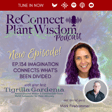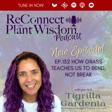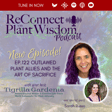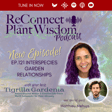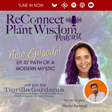
Ep.84 Tomato and Basil: Lessons Beyond the Plate
Dive into a heartfelt story of how two unexpected plant guests, Tomato and Basil, have become profound teachers in my life beyond the kitchen. This episode explores embracing unexpected teachers, understanding the seasonal nature of life, and redefining beauty through the lens of nature.
Discover how these plants have transformed perspectives on natural rhythms, resilience, and authenticity. Join in on a journey that intertwines personal growth with the wisdom of plants, revealing deep insights into connection, adaptation, and the true essence of beauty.
Topics Covered about tomato
➡️ External indicators are not a measure of health
➡️ Redefining beauty through the lens of nature.
➡️ Insights into resilience and adaptation from plants.
Resources Mentioned
🌟Connect with nature-conscious creatives, multipotentialites, and naturentrepreneursin the premier online ecosystem that nourishes plant reawakening and community support for accelerated evolution and co-creation with otherkin. >> JOIN OUR COMMUNITY <<
☝🏽ReConnect with Plant Wisdom podcast Ancient and modern knowledge from biology to spirituality about the wondrous ways plants help you lead a Naturally Conscious life. Subscribe on your favorite podcast player.
// Let's work together: book a Discovery Call
// EcoConscious Business Partners:
Learn and Expand with Gaia
Shop Here
// Opening and Closing music by Steve Sciulli and Poinsettia from The Singing Life of Plants
// Socialize with me Facebook | Instagram | LinkedIn | Youtube

